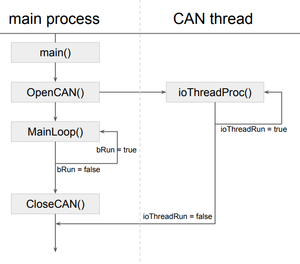CAN Communication Tutorial
CAN_tutorial.zip contains CMakeList.txt, README and grasp directory.
This tutorial will show how to open & close CAN communication. Also, how to get position data and send pwm to operate Allegro Hand. You will follow step by step with adding sample codes. Source code assumes you have a peak-systems pcan to usb adapter so if you are not using PEAK CAN device, please check your own device CAN api and channel.
simple diagram
Below picture shows a structure of a sample program for this tutorial.

main.cpp
You can find main.cpp in grasp directory. There are 3 functions you have to edit.
Initialize CAN I/O thread and start.
// Open a CAN data channel bool OpenCAN() { printf(">CAN(%d): open\n", CAN_Ch); // CAN open int ret = command_can_open(CAN_Ch); if(ret < 0) { printf("ERROR command_can_open !!! \n"); return false; } // initialize CAN I/O thread ioThreadRun = true; pthread_create(&hThread, NULL, ioThreadProc, 0); printf(">CAN: starts listening CAN frames\n"); // set periodic communication parameters(period) printf(">CAN: Comm period set\n"); short comm_period[3] = {3, 0, 0}; // millisecond {position, imu, temperature} ret = command_set_period(CAN_Ch, comm_period); if(ret < 0) { printf("ERROR command_set_period !!! \n"); command_can_close(CAN_Ch); return false; } // servo on printf(">CAN: servo on\n"); ret = command_servo_on(CAN_Ch); if(ret < 0) { printf("ERROR command_servo_on !!! \n"); command_set_period(CAN_Ch, 0); command_can_close(CAN_Ch); return false; } return true; }
Get CAN raw data and identify data to get position values.
// CAN communication thread static void* ioThreadProc(void* inst) { int id; int len; unsigned char data[8]; unsigned char data_return = 0; int i; while (ioThreadRun) { /* wait for the event */ while (0 == get_message(CAN_Ch, &id, &len, data, FALSE)) { switch (id) { case ID_RTR_FINGER_POSE_1: case ID_RTR_FINGER_POSE_2: case ID_RTR_FINGER_POSE_3: case ID_RTR_FINGER_POSE_4: { int findex = (id & 0x00000007); vars.enc_actual[findex*4 + 0] = (short)(data[0] | (data[1] << 8)); vars.enc_actual[findex*4 + 1] = (short)(data[2] | (data[3] << 8)); vars.enc_actual[findex*4 + 2] = (short)(data[4] | (data[5] << 8)); vars.enc_actual[findex*4 + 3] = (short)(data[6] | (data[7] << 8)); // convert encoder count to joint angle for (i=0; i<MAX_DOF; i++) { q[i] = (double)(vars.enc_actual[i])*(333.3/65536.0)*DEG2RAD; } // print joint angles for (int i=0; i<4; i++) { printf(">CAN(%d): Joint[%d] Pos : %5.1f %5.1f %5.1f %5.1f\n" , CAN_Ch, i, q[i*4+0]*RAD2DEG, q[i*4+1]*RAD2DEG, q[i*4+2]*RAD2DEG, q[i*4+3]*RAD2DEG); } break; } default: printf(">CAN(%d): unknown command %d, len %d\n", CAN_Ch, id, len); } } } return NULL; }
CloseCAN()
// Close CAN data channel void CloseCAN() { printf(">CAN: stop periodic communication\n"); //close CAN listening thread if (ioThreadRun) { printf(">CAN: stoped listening CAN frames\n"); ioThreadRun = false; int status; pthread_join(hThread, (void **)&status); hThread = 0; } // CAN close printf(">CAN(%d): close\n", CAN_Ch); int ret = command_can_close(CAN_Ch); if(ret < 0) printf("ERROR command_can_close !!! \n"); }
Copyright & Trademark Notice
Allegro, the Allegro logo, RoboticsLab, the RoboticsLab logo, and all related files and documentation are Copyright ⓒ 2008-2020 Wonik Robotics Co., Ltd. All rights reserved. RoboticsLab and Allegro are trademarks of Wonik Robotics. All other trademarks or registered trademarks mentioned are the properties of their respective owners.
Wonik Robotics's Allegro Hand is based on licensed technology developed by the Humanoid Robot Hand research group at the Korea Institute of Industrial Technology (KITECH).
Any references to the BHand Library or the Allegro Hand Motion and/or Grasping Library refer to a library of humanoid robotic hand grasping algorithms and motions developed and published by KITECH researchers.
J.-H. Bae, S.-W. Park, D. Kim, M.-H. Baeg, and S.-R. Oh, "A Grasp Strategy with the Geometric Centroid of a Groped Object Shape Derived from Contact Spots," Proc. of the 2012 IEEE Int. Conf. on Robotics and Automation (ICRA2012), pp. 3798-3804
Wiki maintained by Sean Yi <seanyi@wonikrobotics.com>
| Whos here now: Members 0 Guests 0 Bots & Crawlers 1 |
